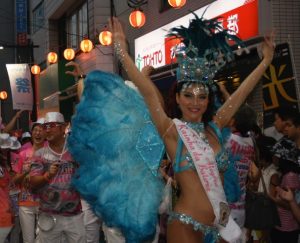Please join us for the following lecture on Thursday, September 24
5:15-6:15 PM, FedEx GEC, Room 4003, UNC-CH
Zelideth Maria Rivas, Assistant Professor of Japanese, Marshall University
“Glocal Multiculturalism in Japan: Idol groups, Matsuri, and Festivais”
Today’s globalism and cosmopolitanism highlight the economic ties of nations by commodifying the diversity of peoples, cultures, and languages present in their own borders, becoming a local multiculturalism. In Japan, this extends globally, highlighting the heterogeneous population of a country that others consider homogeneous, seen in the March 2015 controversy of Miss Universe Japan, Arianna Miyamoto. In this presentation, I examine the consumption of a Brazilian national imaginary in Japan, not as a country of “poverty and crime” but as “Brasil Fantástico!”: land of samba, acai, eternal summer, and carnaval.
 In Japan, there are two contrasting images performed in the Japanese Brazilian community’s festivais and Japanese summer matsuri. I argue that the use of samba in matsuri stereotypes contrasts and further essentializes Japan’s multiculturalism in its presentation of a sexualized, racialized Brazilian musical form. This form is juxtaposed to the forro music present at Japanese Brazilian festivais, f
In Japan, there are two contrasting images performed in the Japanese Brazilian community’s festivais and Japanese summer matsuri. I argue that the use of samba in matsuri stereotypes contrasts and further essentializes Japan’s multiculturalism in its presentation of a sexualized, racialized Brazilian musical form. This form is juxtaposed to the forro music present at Japanese Brazilian festivais, f
etishized as a musical form only known to “pure” Brazilians. These glocal forms of multiculturalism highlight a consumable “boutique multiculturalism” that allows the audience to consume the onstage performances from a distance without engaging proximally with other “undesirable” aspects of multiculturalism, such as the conditions of the Japanese Brazilian community in Japan. The examples of the idol groups Kokoro Gakuen, BJ Heart, and Linda Sansei depict the distal commodification of Japan’s multiculturalism, which highlights a denial of the existing lower socioeconomic class conditions of foreign laborers.
 In Japan, there are two contrasting images performed in the Japanese Brazilian community’s festivais and Japanese summer matsuri. I argue that the use of samba in matsuri stereotypes contrasts and further essentializes Japan’s multiculturalism in its presentation of a sexualized, racialized Brazilian musical form. This form is juxtaposed to the forro music present at Japanese Brazilian festivais, f
In Japan, there are two contrasting images performed in the Japanese Brazilian community’s festivais and Japanese summer matsuri. I argue that the use of samba in matsuri stereotypes contrasts and further essentializes Japan’s multiculturalism in its presentation of a sexualized, racialized Brazilian musical form. This form is juxtaposed to the forro music present at Japanese Brazilian festivais, fetishized as a musical form only known to “pure” Brazilians. These glocal forms of multiculturalism highlight a consumable “boutique multiculturalism” that allows the audience to consume the onstage performances from a distance without engaging proximally with other “undesirable” aspects of multiculturalism, such as the conditions of the Japanese Brazilian community in Japan. The examples of the idol groups Kokoro Gakuen, BJ Heart, and Linda Sansei depict the distal commodification of Japan’s multiculturalism, which highlights a denial of the existing lower socioeconomic class conditions of foreign laborers.
Sponsored by the Department of Asian Studies, the Carolina Asia Center, and the Triangle Center for Japanese Studies
